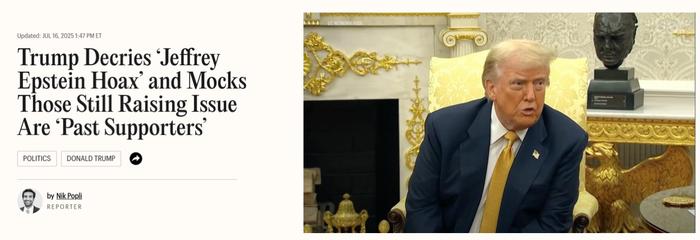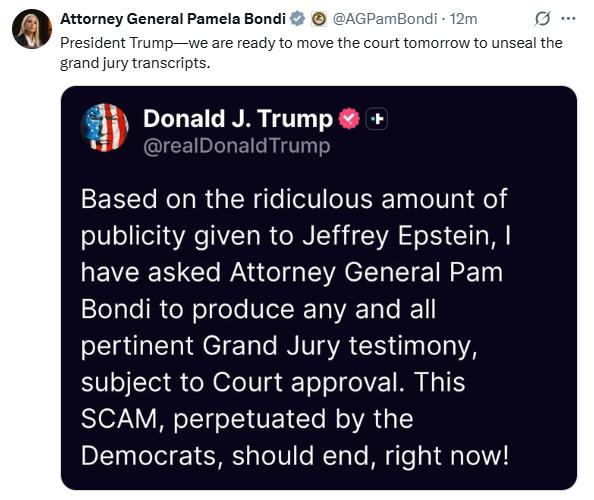

Recently, President Trump has once again voiced his opinion on the Epstein case—claiming that he no longer needs the support of those who believe in the “Epstein scam,” criticizing the “Trump-Epstein letter” report by The Wall Street Journal as “fake news,” and has also stated that all relevant grand jurors’ statements should be made public.
Last week, Trump had expressed that “no one cares” about the Epstein case and that there is no need to waste more time or energy on it.
Musk Responds Again with 13 Posts in 60 Minutes
According to U.S. media reports, Trump claimed that “Epstein” is a scam and said that those still firmly believing in him are no longer in need of their support.
In response to calls for the release of the Epstein case, Trump posted on his social media platform “Reality Social” on the 16th local time, harshly criticizing his “past supporters” as easily deceived “weak people,” and stating that he no longer needs the support of those who believe in the “Epstein scam.”
U.S. media have found that Elon Musk, an American entrepreneur and former head of the “Government Efficiency Department,” sent out 13 posts in 60 minutes on the afternoon of the 16th, continuously “responding.”
△ Musk posted, “I can’t believe Epstein committed suicide before realizing it was a scam.”
On the 17th local time, Musk responded to Trump’s claim that the “Epstein case is a scam” on social media platform X, saying,
“I can’t believe Epstein committed suicide before realizing it was a scam”
In fact, after breaking with Trump, Musk frequently “responded” to the Epstein case. On June 5 this year, he stated on social media that the real reason the documents have not been made public is because Trump appears in Epstein’s files. However, Musk later deleted that post.
Trump, repeatedly denying any involvement in the Epstein case, issued a statement on July 17 regarding a report by The Wall Street Journal about “Trump’s Letter to Epstein,” labeling it as “fake news” and stating that he would sue this “nasty little tabloid.”
The report from The Wall Street Journal on July 17 stated that during Epstein’s 50th birthday in 2003, a leather-bound birthday album prepared for him by a friend, Maxwell, included a letter signed by Trump. The letter was lighthearted and contained several lines of text.
In response, Trump posted a lengthy message on social media, stating that he and White House Press Secretary had directly informed The Wall Street Journal Editor-in-Chief Emmanuel Tamkor about the so-called “Trump Letter to Epstein” being entirely fabricated. However, Tamkor ignored this. “The Wall Street Journal still insists on publishing this false, malicious, and defamatory report. President Trump will soon file lawsuits against The Wall Street Journal, News Corporation, and Mr. Murdoch.”
U.S. Attorney General: Request Court to Unfreeze Recordings
On July 12, Trump expressed on social media that “no one cares” about Epstein and that there should not be more time or effort spent on his case.
△ U.S. Attorney General William Barr stated on social media platform X that the Department of Justice (DOJ) is preparing to request court permission to unfreeze the grand jury recordings on July 18.
On July 17, Trump wrote that given the excessive hype surrounding the Epstein case,
he has requested Attorney General Barr to release all relevant grand jury testimony under court approval. He described the incident as a “fraud orchestrated by Democrats” and called for an immediate end to it. Shortly after making this statement, Barr stated on social media platform X that the DOJ is preparing to request court permission to unfreeze the grand jury recordings on July 18.
The consensus between the two parties in the United States is difficult to conceal the divisions within the party. On July 17th, local time, the House Rules Committee of the U.S. voted 9-4 to pass a resolution that lacks legal binding force, calling on the Attorney General to disclose “credible documents and communications” related to Epstein and his former partner Maxwell, but excluding information involving the identity of victims or violations of procedures.
This case is merely an internal action within the House and does not have legal coercive power.
The Democrats criticized the resolution as “covert voting,” stating that the Republican Party was responding to the pressure it faced after earlier vetoing a proposal for mandatory disclosure.
Democrats proposed to push forward with a more effective bill, which was rejected by the Republicans.
The MAGA camp’s cracks deepened.
According to reports from American media, on July 16th, local time, Trump harshly criticized some members of the Republican Party who were still demanding more information about Epstein.
It is observed that what attracts more attention than the bipartisan battles is the obvious split within the “Make America Great Again” (MAGA) camp.
Trump and the mainstream MAGA camp are trying to shape the image of “We protect privacy and the rule of law, not being swayed by noise,” but their internal discontent has not fully dissipated. The grassroots and extreme right wing within the MAGA camp continue to question “the truth is hidden,” and may use this as a bargaining chip against government concessions.
As the mid-term elections in 2026 approach, the debate over the boundaries of transparency and privacy within the MAGA camp has not ended, and its internal dynamics will continue to revolve around how to balance grassroots passion with party stability.
Epstein had close interactions with numerous American politicians and business figures. After being arrested on suspicion of sexual crimes, he died in prison in August 2019, and was found to have committed suicide. During his presidential campaign last year, Trump promised to release Epstein’s “customer list” to expose Epstein’s crimes and the truth behind his death.
The United States Department of Justice and the Federal Bureau of Investigation issued a joint memorandum on the 7th of this month, declaring that there is no “client list” and no further documents related to the Epstein case will be released. This conclusion has sparked skepticism and dissatisfaction within the Trump camp, with Trump himself having voiced his concerns multiple times recently.